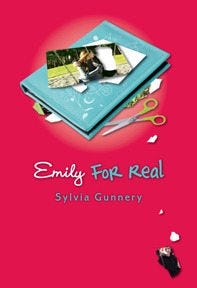Interview with Sylvia Gunnery: Author of <em>Emily For Real</em>

by
Rachel Seigel
---

Seventeen-year-old Emily thinks it's the end of the world when her boyfriend dumps her from college, and she's heartbroken and miserable. Things get a whole lot worse when her grandfather dies, and a series of family secrets are revealed that threaten to tear her family apart. Then Emily meets Leo- a troubled boy in her class who has troubles of his own. Leo struggles to be father and mother to his little sister while his deadbeat dad darts in and out of the picture, and his mother struggles with alcoholism. The two friends lean on each other, and help each other to find the strength to deal with whatever life throws at them. Emily for Real, a new young adult novel from Canadian Publisher Pajama Press, is a drama-filled read that will appeal to readers who enjoy edgy and realistic reads. Earlier this month, I had a chance to catch up with author Sylvia Gunnery and interview her about her book. Here's what she had to say: 1. When you started writing Emily For Real, which came first for you: the characters or the plot? With this book, as with just about all the fiction I write, the theme comes first. I find myself daydreaming about something—in the case of Emily For Real, it was family secrecy—and I start wondering: What’s this all about? Why do people do this? What happens to others who happen to be inside the circle of events? Long ago, a friend told me about a secret she was keeping from her children, waiting, she said, until they were older. I wondered whether the children would somehow have a sense of things being tilted away from the truth even before the facts were made clear to them. I wondered how they would react when they finally knew the lives they were living had, to some extent, been fiction. Eventually, I started Emily’s story. 2. What was the biggest challenge in writing Emily For Real? I knew the family secret that directly involved Emily even before I started to write, and I knew which characters knew and which ones did not. For the first few months of writing, I wrote in the third person. It was easy to plant things here and there, hints and diversions from that viewpoint. But, eventually I realized the story needed to be told in Emily’s voice. So it was a real challenge to tell the story from the point of view of the person who had no idea at all about that particular family secret. She’d say things and notice things that were so close to the truth, but not actually see it. 3. Is there anything that, in hindsight, you wish you had done differently with Emily For Real in the writing or publication process? It’s not really that helpful to look back and wish something else for Emily and her family. As in real life, these kinds of wistful regrets take you out of what actually is now and present. But I will say there is something I wish I had not changed because, to me, it made more sense. I had written that Emily and Jacob had sex that first day they met—intense and thrilling. She was especially vulnerable, needing to really feel—maybe even affirm— her own existence. In the very last stages of the editing process for my novel, the sex was nixed. I could see how the decision not to have sex with Jacob would show Emily as moving forward, taking control, so I went along with the suggestion. If we had had more time, I would have taken my editor’s advice and moved the sex scene with Jacob forward, perhaps even before she met Leo. In the long run, I’m fine with the decision we made. 4. Tell us a little about your journey to publication. The manuscript (called "The Seventh Crow", throughout the draft stages) had been rejected twice in the year after I finished it (2009). The first rejection was a very short note that included “While you are a lovely writer…” Half a year later came the second rejection that was so strongly complimentary I sent it to Gail Winskill of Pajama Press to encourage her not to leave my manuscript in the “slush pile.” Gail and I finally met, a few months later, in Toronto at an outdoor café and we talked about Emily’s story. During our conversation, I had a really strong sense that Gail was not going to publish the book. We left the café and were standing on a busy corner when she offered me a contract. I was very, very happy that this book had found its place at Pajama Press, a new Canadian publishing house with amazing creative energy and vision. 5. If you were transported into your book, which scene would you most want to re-enact? Throughout the novel, Emily walks out into the night alone. She’s not comfortable with these walks, and finds herself in real danger one night in particular. For me, those walks were very interesting to write—watching her make wider and wider circles out from home and then back again. I’d like to be there with her on the last walk of the book. I know she was aware of her own independence—not that she had fully reached independence, but she would be getting a sense of moving out toward it. I’d really like to have a conversation with her about what she thought was next for her and how much the past would play into her life. 6. What’s your next writing project? In May, I started making notes on my next project and doing some daydreaming about the ideas. I’m now writing some tentative first pages. I’m thinking about sisters. Their perceptions of themselves individually and of each other. How experiences are shared or not. What sisters do and do not choose to reveal to each other. And inside all this, I’m thinking about how very different it is to be 16 and 17 and 21 even though these ages are all within a span of about 5 years. 7. What’s a typical writing day for you? Morning is my best writing time. I usually begin after I’ve had coffee and a chance to chat with my partner Jim. Often, I’m still in my housecoat here at my desk at 11 o’clock (very awkward when someone knocks on the door—I imagine them thinking I’ve slept in). For a couple of hours, I try to abandon the writing and get into my garden or do chores or go for a walk on the beach. Even then, I’m writing—listening to conversations in my head or imagining events. Late afternoon is usually a time for the business of writing—emails, phone calls, etc. Then, if I can, I go over some of the writing I’ve done and tighten things up. And always, sometime in the day, I read others. 8. When do you decide your book is ready for your editor’s eyes? I do not have a writing group or a critical reader who offers suggestions. For me, that doesn’t work. I want to puzzle through the draft, look for holes to be filled and things to be scrapped. That’s the fun of fiction. The writing is ready for an editor when the story’s finished—the characters are quiet. I mean that literally. The morning after I finished "Emily For Real", I woke to silence. It was eerie, actually. None of the characters were moving around in my head, thinking something or saying something to others. “The End.” But, editors are absolutely necessary. They see what I can’t see. I always listen very carefully to their suggestions, even to the point of changing direction in a book if an editor gives a strong enough argument. 9. What are you reading now? In 15 days, I have a deadline to complete the first draft of a juvenile novel in a sports series. For me, when a deadline is so close, I really can’t read books. Not in the way I want to sink right in and enjoy them. So right now I’m reading magazines— specifically "The Walrus" (the summer issue has three short stories written by Canadian authors who had been asked to revisit characters from earlier novels—all excellent!) and The New Yorker (today I read an article about James Joyce). 10. Any final words of advice or inspiration? On a clip next to my computer is a quote I scribbled years and years ago when Margaret Laurence was being interviewed on CBC radio: “Your whole novel constitutes your view of life.” Laurence’s words are there to remind me that what you write is who you are. Even when you can’t see your own view of life, it’s there. If not, why are you writing? This has inspired me to really work hard to know what I’m writing, why I’m writing it, and to stay true to my own view of life. As closely as I can, I do that. Thanks very much to Sylvia Gunnery and Pajama Press for including us in this special summer blog tour. In honour of the tour, Pajama Press has offered to give away a copy of the book to one of our readers. (U.S. and Canada only please). Enter to win a Copy of Emily For Real Courtesy of Pajama Press.
---

Rachel Seigel is the Children's/Young Adult Book Buyer at wholesaler S&B Books in Mississauga, Ontario. She also maintains a personal blog at http://readingtimbits.blogspot.com and can be found on Twitter as @rachelnseigel.
